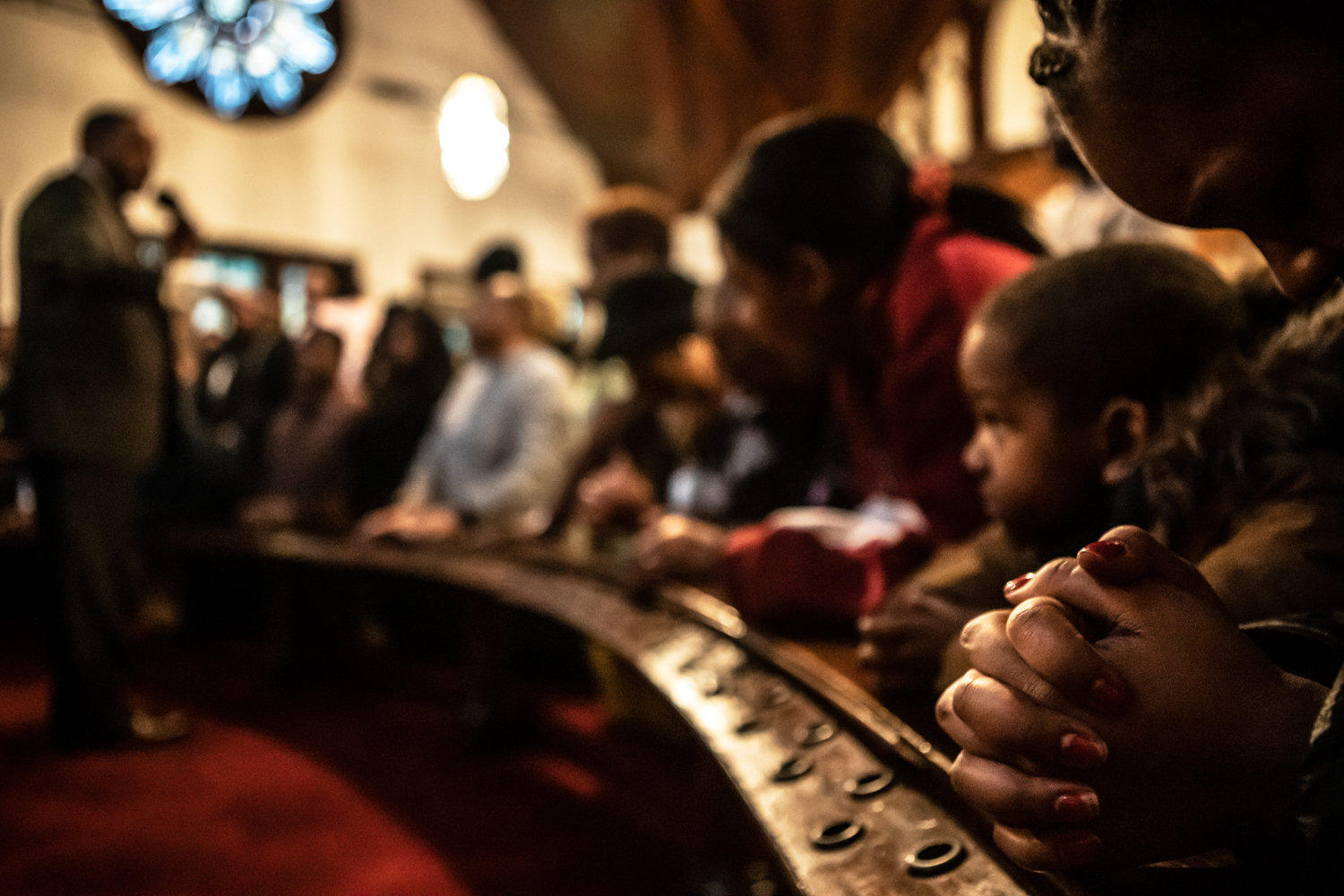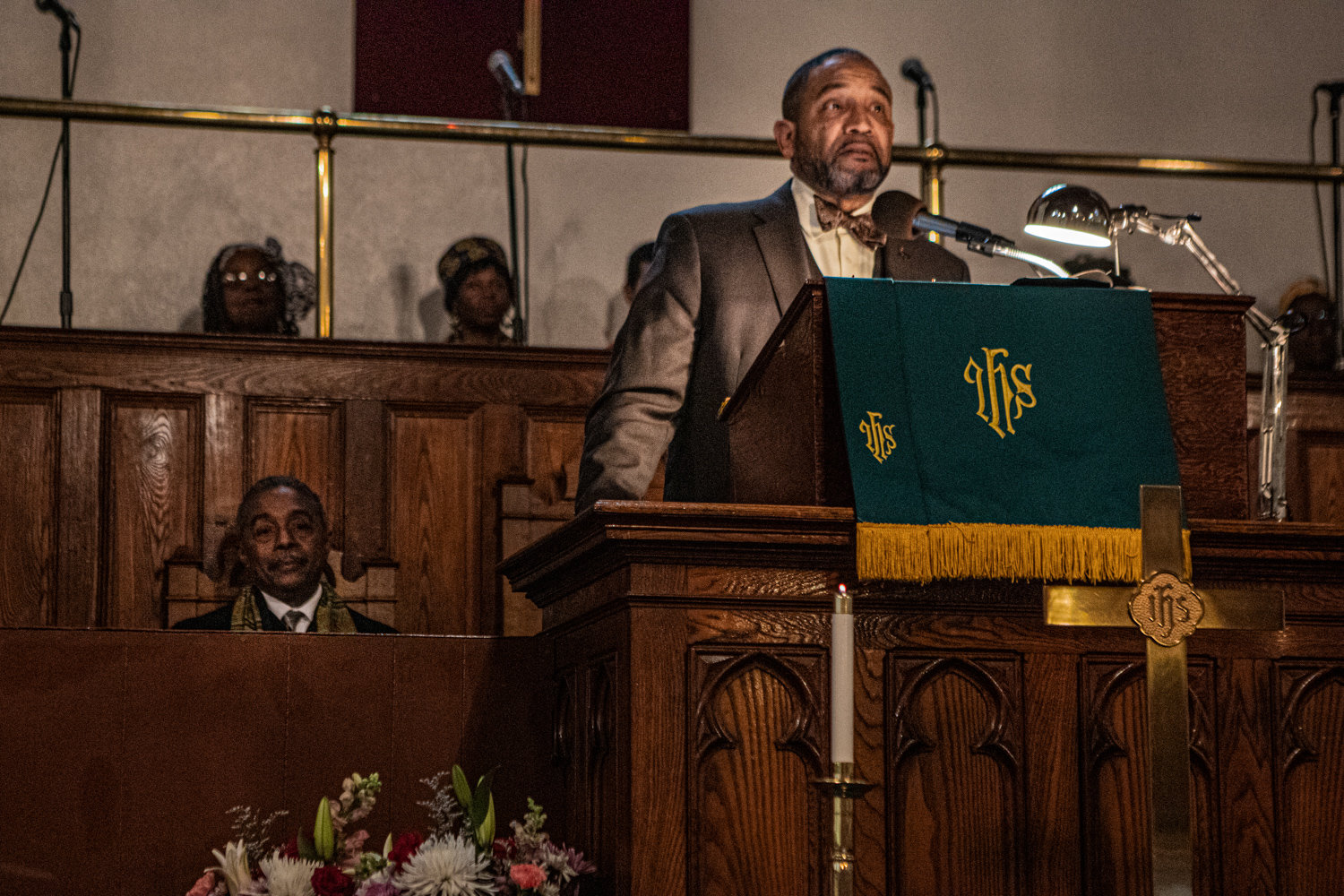St. Stephen's celebrates 195 years as cornerstone
It’s an age-old question: Is Marble Hill part of the Bronx? Or part of Manhattan?
It might be something fun to debate with friends on a rainy day, but the weather was a balmy 56 degrees outside St. Stephen’s United Methodist Church on West 228th Street. And the “friend” in this case was none other than the Rev. Hermon Darden.
Officially, the tiny neighborhood of Marble Hill where the historic church building sits is part of the northernmost section of Manhattan. But, it stands just across the Harlem River from the actual island of Manhattan, so geographically at least, Marble Hill is in the Bronx.
Darden was adamant the church was a cornerstone of a Bronx neighborhood, but then again stopping by to celebrate St. Stephen’s 195th anniversary was not Bronx borough president Ruben Diaz Jr., but instead Manhattan borough president Gale Brewer. And don’t tell her Marble Hill is in the Bronx.
“We are in Manhattan,” Brewer declared during remarks commemorating nearly two centuries of the congregation worshipping in the community.
And a lot has happened during that time — never mind the fact the church existed before New York City pushed this far north. Circuit rider preachers, now known as traveling clergy, rode between congregations in what would become the Bronx and Yonkers beginning in 1825. On Valentine’s Day 1835, the congregation settled at Old Albany Post Road, becoming the Methodist Episcopal Church Bethel.
Long road getting from there to here
The congregation had one more home at West 231st Street before moving into their current home in 1898, when William McKinley was still president, and the church itself already more than 70 years old. The now-iconic building designed by famed restoration architect Alexander McMillan Welch was just a year old, built into the hillside at West 228th Street and Marble Hill Avenue.
Over time, the congregation dropped “Episcopal” from its name, becoming just a Methodist church. For Darden, however, maintaining the church as a cornerstone of the community is crucial to day-to-day operations.
“Ministry is very important in this place,” he said. “It’s not a clubhouse ministry, it’s a social ministry. And they’re very much concerned about the life of the community, and that makes it very exciting for me because these are people who are concerned about outreach and social connection.”
His congregants are involved in their community, he said, serving on the 50th Precinct’s community council and the Marble Hill Tenants Association, always looking to help out neighbors. The church itself holds a food pantry and serves an annual Thanksgiving dinner.
“We are really, literally, feeding the hungry in many ways,” Darden said. “Whatever the need is, we try to respond to it, to be not just a house focused on religion, but a community center as well.”
Even neighbors who don’t attend the church see it as a place that grounds them in their community.
“When I see people out on Broadway who I don’t know, and they know I’m the pastor, I say, ‘Well, what church do you belong to?’” Darden explained. “They say, ‘Oh, St. Stephens,’ and I say, ‘Well, now, I want to see you in church.’
“But as a constituent, they relate to St. Stephen’s as an anchor for their families.”
Trevaughn Lattimore and Amber Gooden, who both sing in the choir at St. Stephen’s, said the church feels like a second home to them.
“It’s about growth, change and uniting people,” Gooden said. ”And bringing generations back.”
She met Lattimore and another friend, Tyrell Brown, inside the walls of St. Stephen’s. Brown joined in 1999 after being introduced to the church by some friends. They don’t attend anymore, he said, but he can’t see himself anywhere else.
Lattimore started attending when he was just 3. His grandmother, who lived in the Marble Hill Houses nearby, started bringing him along, and the church’s choir and focus on music intrigued him. Within just about two hours at their anniversary service, the chorus sang eight hymns and spirituals.
“I think I started around age 8, or 9,” Lattimore said. “I started singing in the choir. I just got used to it, the flow of the choir, and I love the people in the church.”
History provides chance to see growth
And how do they feel about being part of a church with such a long local history? Talking over each other, the three friends said it feels good, and that it’s a blessing.
“We get to see what we really became,” Gooden said. “The people stay the same, but the culture is different. Before we came into this church, we were like little kids.”
Making sure the church is inclusive is a major goal for 2020, Brown said.
“This Methodist church, we invite anybody,” he said. “No matter how you look, dress, we allow anybody, and we open our doors to a lot of people. And that’s one of our major goals of this church, to get more of this community.”
During his anniversary sermon, guest preacher David Gilmore asked the congregation how many churches would turn away Jesus himself if he turned up in the wrong clothes, or looking the wrong way. Gilmore emphasized the need to look beyond the surface, that the community must take in those in need.
The stretch of Marble Hill Avenue between West 228th and West 230th streets is co-named Rev. Dr. William Tieck Way, after the church’s former beloved pastor.
He was integral to welcoming the new residents of Marble Hill Houses into the community in 1952, and helped to establish the church’s practices of being present in the community.
He worked to found the Kingsbridge Historical Society, sat on the board of the Riverdale Mental Health Association, and served as the borough’s historian through the 1980s, according to his obituary in The New York Times.
That community outreach has changed with the times, Darden said. The modern Methodist church, for example, has struggled with growing acceptance of LGBTQ congregants.
“United Methodists around the world are talking about whether we welcome LGBTQIA people,” Darden said. “They’re thinking about splitting. We welcome everyone. This is very painful, to think that your church is going to divide, and there are some so narrow-minded that they will not welcome anyone, whoever they are, whomever they love.
“But we do here at St. Stephen’s.”









